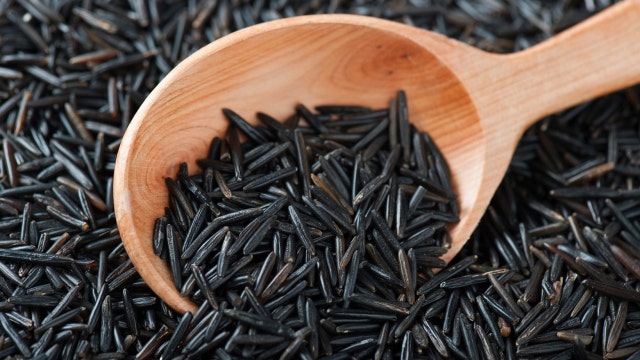Is black rice a new superfood?
You’ve heard that brown rice is better for you than white rice but have you ever heard of black rice? Turns out there’s lots of health benefits and it could be the newest superfood
According to traditional lore, black rice, a popular superfood, was once consumed only by royalty. Known alternately as forbidden rice, emperor’s rice, or longevity rice, black rice is actually a dark purple grain. Cultivated throughout Asia, black rice is now taking a place on the world stage as a superfood with novel and highly beneficial attributes.
For those who grew up on Minute Rice and Uncle Ben’s, it may come as a surprise to discover a plethora of colorful rice, including white, beige, brown, green, red, and the fabled black varieties. Different types of black rice are cultivated throughout China, Southeast Asia and India, and the star of this grain is rising.
Black rice owes its deep color to a range of naturally-occurring compounds called anthocyanins. These are the same agents found in the purple berries like acai, blueberry, blackberry. Anthocyanins have garnered well-deserved attention as a class of extraordinary beneficial agents that reduce the aging of cells, stem inflammation, enhance eyesight, improve many aspects of cardiovascular health, enhance brain function, and help to stabilize blood sugar. All of the buzz about pomegranate, cranberry, and many other red-to-purple foods is due to their concentration of anthocyanins— they are the big dudes in antioxidants.
At the same time that black rice offers health benefits galore, it also satisfies the palate. These varieties of rice have a delicate, nutty aroma when cooked, and offer satisfying, complex flavor. This makes black rice more than a starch— the addition of black rice to any meal with vegetables, fish, or meat transforms a dining experience. The exquisite fragrance and flavor combination offered by this grain makes a welcome contribution to any meal.
For those who are on gluten-free diets, black rice is good news, as it contains no gluten at all. But the grain is high in dietary fiber, antioxidants, vitamin E, some of the B vitamins, and minerals. The big action is unquestionably with the purple anthocyanins, which are so concentrated in black rice that it tops blueberries for antioxidant activity.
The three big categories of benefit from eating black rice are improved antioxidant activity, anti-inflammatory action, and appetite and fat-controlling properties. The potent antioxidant activity of the anthocyanins in black rice switches on genes in the body that control the production of cell-protective agents. The anti-inflammatory activity of these same purple compounds helps to reduce the risk of virtually every chronic degenerative disease, from cardiovascular disease to skin ailments. But it is the appetite and fat-controlling aspects of black rice that have attracted the most attention among health researchers.
In the quest to reverse obesity in the global population, researchers have sought agents that can improve the production of a protein in the body known as adiponectin, and decrease levels of the appetite-regulating hormone leptin. This signals the body that you have eaten enough. Enter black rice, seemingly tailor-made for the task. Black rice offers hope to those who wish to control their weight. Among the various anthocyanins in black rice, one known as C3G, or Cyanidin-3-glucoside demonstrates appetite satisfying properties by boosting adiponectin and decreasing blood levels of leptin. This makes black rice a satiety food. It tells your body that you are full, and you are no longer hungry. In simpler terms, eat black rice; feel full.
But that’s not all. Japanese researchers have found that C3G also causes the body to burn stored fat, and to help to establish a healthier body weight overall. This activity is of great interest to athletes, who are seeking a more stable level of blood sugar during exertion. But this is of greatest interest to those who struggle with their weight. Black rice can make a positive contribution to steady, even weight control, by reducing appetite and using up stored fat.
Thanks to endless curiosity about foods, coupled with modern science, we are able to plumb the depths of nutrition, furthering our understanding of how traditional foods enhance health in modern terms. Black rice, also known as longevity rice, earned its reputation as a life-enhancing treasure centuries ago, and continues to demonstrate powerful health benefits today.









































